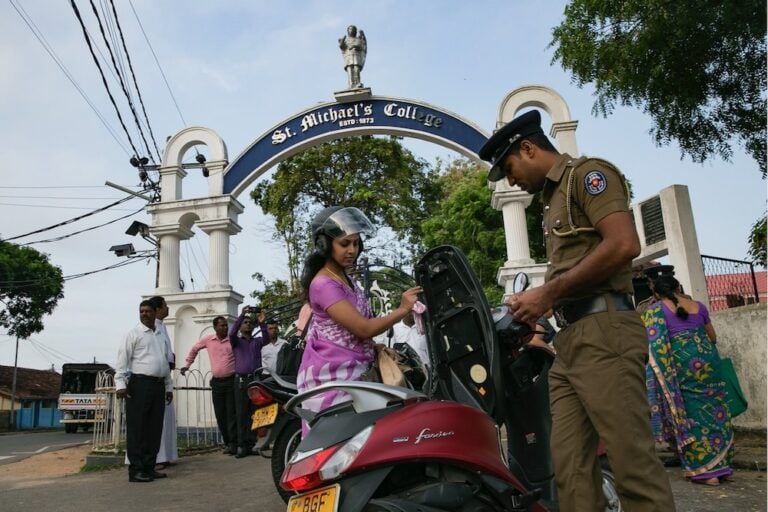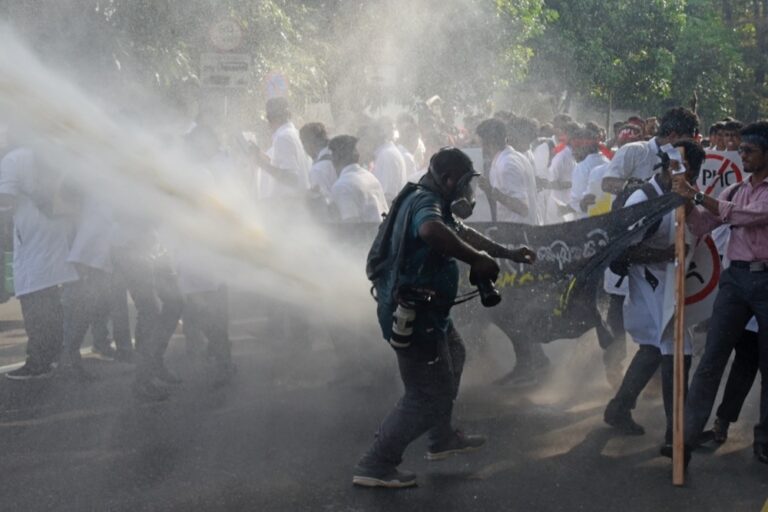(FMM/IFEX) – The following is a 7 February 2000 Free Media Movement press release: PRESS STATEMENT THE NEW GOVERNMENT REGULATIONS ARE AN OBSTACLE TO FREEDOM OF INFORMATION The Free Media Movement believes that the press release issued by the government on February 1, 2000, drawing attention to a Cabinet decision to require strict adherence to […]
(FMM/IFEX) – The following is a 7 February 2000 Free Media Movement press release:
PRESS STATEMENT
THE NEW GOVERNMENT REGULATIONS ARE AN OBSTACLE TO FREEDOM OF INFORMATION
The Free Media Movement believes that the press release issued by the government on February 1, 2000, drawing attention to a Cabinet decision to require strict adherence to several regulations set out in the Establishment Code constitutes a further restriction of the freedom of information of the people of this country.
By reactivating several obsolete regulations set out in the Establishment Code, which is only relevant to public officials, the People’s Alliance government has once more demonstrated its tendency to hide the truth from the people.
The government press release of 01.02.2000 states that according to a proposal made by Media Minister Mangala Samaraweera, the Cabinet has decided to require strict adherence to Section 3 of Chapter XXXI of Volume 1 and Section 6 of Chapter XLVII of Volume II of the Establishment Code, and to take disciplinary measures against all public officials who contravene these regulations.
Section 3.2 of Chapter XXXI of the EC prohibits public officials from writing articles critical of the government or of any government department, from giving interviews to the press and from furnishing any complaints to the press regarding difficulties in providing public services because of financial constraints or shortage of staff. Public officials, with or without political rights, are also prohibited from expressing any criticism or dissatisfaction with any decision taken by the government or any government policy.
According to Section 6 of Chapter XLVII, information about the activities of any government ministry or department can be given to the public only by the Secretary to the Ministry or by the head of the department concerned, according to their discretion. Not only releasing data and statistics but even the voicing of an opinion is prohibited, and can be released to a newspaper only through the Director of Information.
Sri Lanka is a signatory to the International Covenant on Civil and Political Rights. According to Article 19 of this Covenant, the right to information should be guaranteed. The People’s Alliance government has accepted that this is a right by including it in their draft of the proposed new Constitution. The government has also accepted that there should be transparency in affairs of the government.
It is in this context that the Free Media Movement vehemently condemns the snatching away of the people’s right to information through this reactivating of draconian regulations that were imposed by the colonial regime to make the public service a virtual prison camp.
According to the Establishment Code, it is the Institutional Director of the Ministry of Public Administration who has the right to take action under these regulations. However, empowering the Director of Information with these “policing” duties in contravention of the procedures set out in the Establishment Code can be seen as a reflection of things to come not only for the media, but for public services in general.
VARUNA KARUNATILAKA
Convenor
SUNANDA DESHAPRIYA
Secretary
07.02.2000


